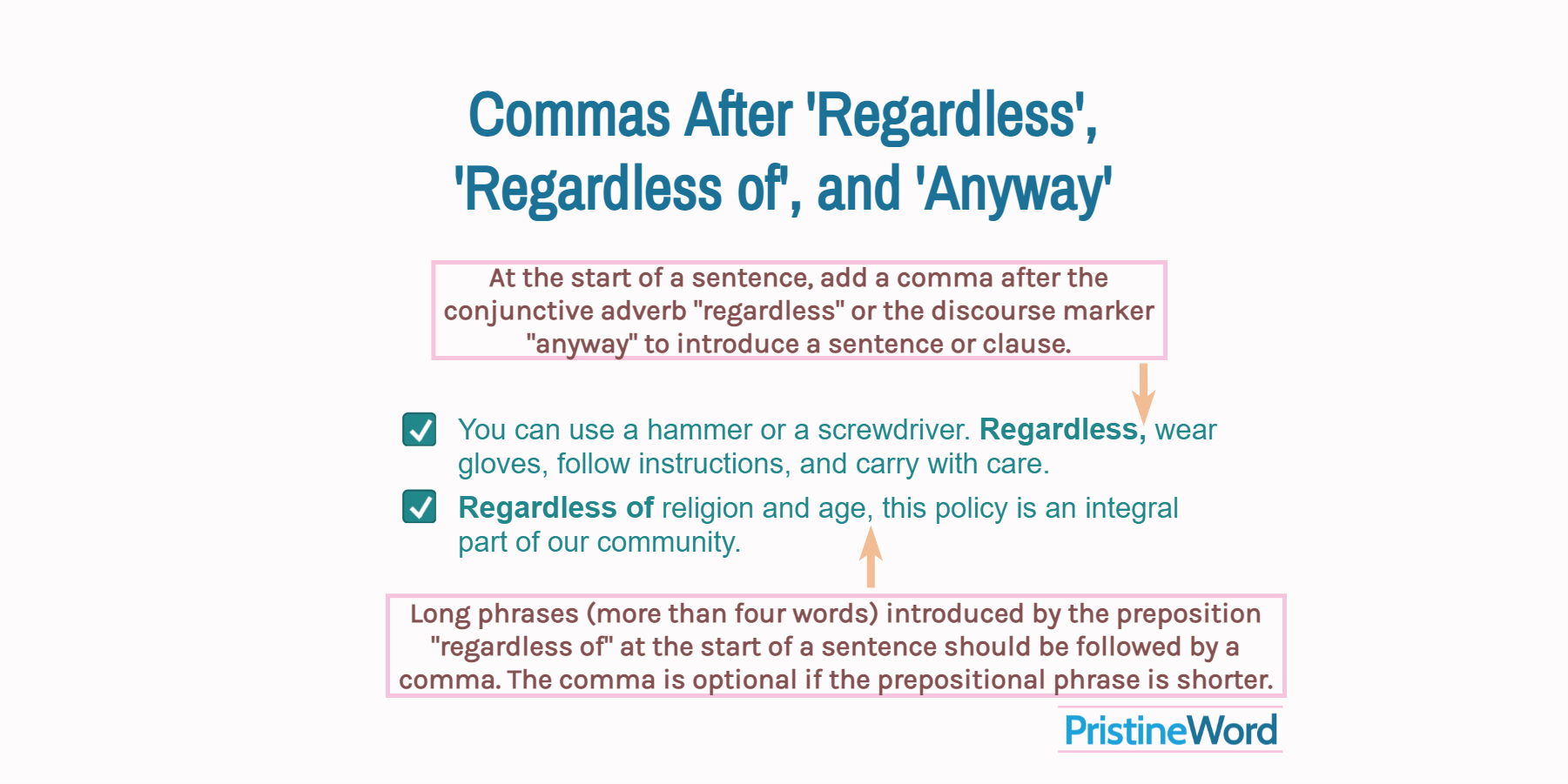At the start of a sentence, add a comma after the conjunctive adverb "regardless" or the discourse marker "anyway" to introduce a sentence or clause.
At the start of a sentence, add a comma after the conjunctive adverb "regardless" or the discourse marker "anyway" to introduce a sentence or clause.
You can use a hammer or a screwdriver. Regardless, wear gloves, follow instructions, and carry with care.
Anyway, I have to leave before noon.
Long phrases (more than three or four words) introduced by the preposition "regardless of" at the start of a sentence should be followed by a comma. The comma is optional if the prepositional phrase is shorter than five words.
Regardless of religion and age, this policy is an integral part of our community.
Contents
1. Punctuation of 'Regardless' and 'Regardless of'
Despite having a similar meaning, "regardless" and "regardless of" are not used in the same way. These words require a different sentence structure.
- "Regardless" is an adverb. It means "despite the prevailing circumstances", "anyway", or "in any case". (e.g., "I always tell her not to go, but she always goes wherever she wants, regardless.")
- "Regardless of" is a preposition. Prepositions are followed by a noun or a pronoun (e.g., "Those protections should be extended to our children, regardless of nationality.")
1.1 'Regardless'
At the start of a sentence, add a comma after the conjunctive adverb "regardless" to indicate that it modifies not a single word but a whole clause or sentence.
Olivia was told not to go. Regardless, she always does what she wants.
"Regardless" can also come in the middle or at the end of a sentence. In this case, use commas only to stress a pause for readability or to avoid confusion.
Jennifer is always assuming the worst-case scenario, regardless.
But no comma is necessary if the interruption is slight.
Peter hasn't toured the property in person, but he wants to buy it regardless.
1.2 'Regardless of'
"Regardless of" means "in spite of" or "without considering".
Our organization serves all people, regardless of religion, ethnicity, or gender.
Prepositions, such as "regardless of", should not be separated with a comma from the noun or pronoun that follows.
You must go to France regardless of the circumstances.
But use a comma after the prepositional phrase introduced by "regardless of" at the start of a sentence if the phrase contains more than three or four words.
Regardless of gender, ethnicity and religion, we all need a better world.
Regardless of gender, ethnicity and religion we all need a better world.
If the introductory phrase is brief (less than three or four words), the comma is optional.
Regardless of destination passports must be valid for at least three months after the return date.
In the middle of a sentence, you should use commas to set off parenthetic or nonessential information (information that can be safely removed without changing the meaning of the sentence) introduced by the preposition "regardless of".
I want to visit Indonesia, regardless of my mother's opinion, to explore its tropical forests and pristine beaches.
But do not use commas if the phrase introduced by "regardless of" describes a single verb or adjective instead of a clause.
This is true regardless of company policies.
2. Commas After 'Anyway'
The adverb "anyway" can be used as:
- a synonym of "regardless" (e.g., "I asked Alice to stop, but she did it anyway"), or
- an introductory word or discourse marker (e.g., "Anyway, I have to leave right now.")
Introductory words, such as "anyway", "now", or "well", should be preceded by a semicolon (or a period) and followed by a comma.
We were searching for a place to eat. Anyway, we eventually found a nice Chinese restaurant.
Anyway, your opinion is always important to us.
We often use "anyway" in the middle or at the end of a sentence as a regular adverb; that is, as a word that help us describe a single verb or adjective. Do not place commas in this case.
You are approaching an intersection anyway.
University degrees are overrated anyway.

